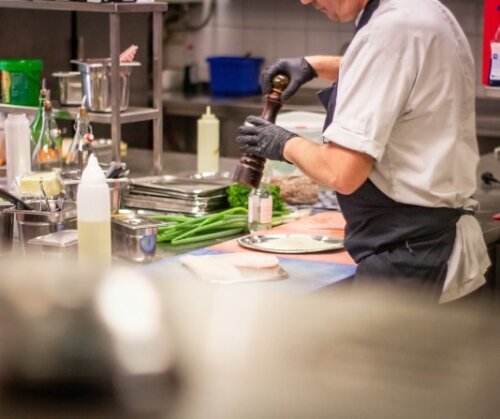Plant-based meat and cheese substitutes may contain more harmful substances than their animal counterparts
Alicia Macan Schönleben (UAntwerp) researched ultra-processed plant foods
A new generation of plant-based foods offers a full-fledged alternative to animal products such as meat, fish and cheese. But scientists from UAntwerpen discovered that these often ultra-processed substitutes may contain higher amounts of certain harmful substances.
Animal welfare, the environment and climate, your health... There are plenty of good reasons why people become vegan or vegetarian. The diet is on the rise and the food industry is capitalising on this. ‘There are more and more ultra processed novel plant-based foods (NPBFs) on supermarket shelves,’ says PhD student Alicia Macan Schönleben, affiliated with the Toxicological Centre (UAntwerpen). ‘These plant-based products undergo extensive industrial processing and often contain a long list of ingredients and food additives.’
Plasticizers and organophosphate flame retardants
Ultra-processed plant-based alternatives lower the threshold for a vegan or vegetarian diet. But are they safe? Macan Schönleben: ‘Scientific research mainly focuses on at the impact of NPBFs on the environment or on consumer perception. Much less is known about the possible chemical contamination or the safety of these products.’
Therefore, the Toxicological Centre, under the leadership of Prof Adrian Covaci and Dr Giulia Poma, analysed 52 (ultra)processed plant-based foods bought in 3 European countries (Belgium, Germany and the UK). The scientists examined the products for two classes of chemicals: organophosphate flame retardants and plasticisers. ‘The first group is used as flame retardants, for example in production equipment,’ explains Macan Schönleben. ‘The plasticisers, in turn, serve to make the texture of for example packaging more flexible.’

Certain plasticisers and organophosphate flame retardants can have harmful effects on the brain and thyroid, for example.
‘Scientists have not yet figured out just how toxic they are,’ Macan Schönleben continued. ‘But research has already shown that certain plasticisers and organophosphate flame retardants can have harmful effects on the brain and thyroid, for example. They can also be carcinogenic and have a negative impact on fertility.’
Plastic packaging
The researchers found that the studied NPBFs contained higher concentrations of organophosphate flame retardants and plasticisers than their animal counterparts. Especially in the cheese substitutes, the levels were found to be significantly higher. ‘We suspect that these plant-based foods get ‘contaminated’ during the food processing. The plastic packaging of the products could also be a possible source.’
So is a vegan diet still safe? The study shows that exposure to these two classes of harmful chemicals is higher with a strict vegan diet than with an animal-based diet. ‘There is no immediate risk to your health when eating these plant-based products, but we advise against completely replacing all animal products in your diet with NPBFs. Moreover, a balanced plant-based diet with whole foods is better than relying largely on these ultra-processed NPBF products,’ concludes Macan Schönleben.
The full scientific article is at Organophosphorus Flame Retardant, Phthalate, and Alternative Plasticizer Contamination in Novel Plant-Based Food: A Food Safety Investigation - PubMed